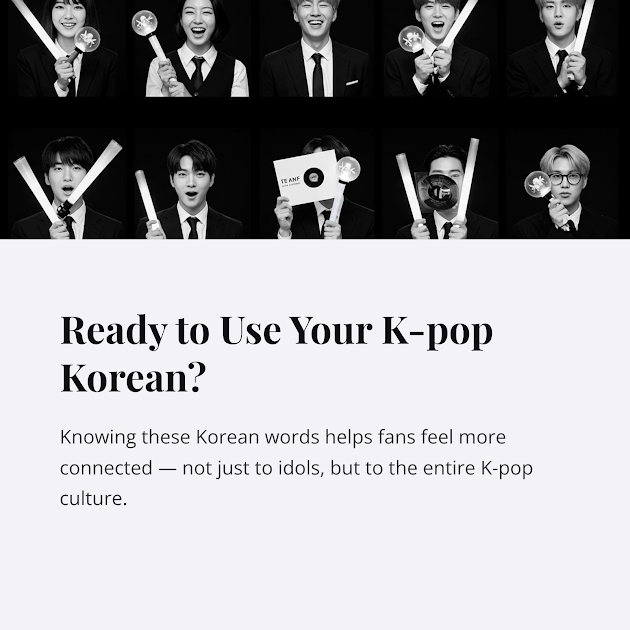Understanding just a few Korean words can bring you closer to your favorite K-pop idols.
From lyrics and interviews to fan meetings and online communities,
these Korean terms are used constantly and knowing them helps you feel more connected and involved.
Want to enjoy K-pop even more? Start with these must-know words!
K-pop is more than just music — it's a global cultural phenomenon.
And if you're a fan, learning the most common Korean words can help you
understand fan culture, idol interactions, and even song meanings more deeply.
Here are 10 essential Korean words every K-pop fan should know — with meanings and examples.
입덕 (Ipdeok) — “Becoming a fan”
This slang means “falling for someone” and officially becoming a fan.
It's often used when someone is newly obsessed with a group or idol.
Example: "I saw their performance and totally 입덕-ed!"
Key point: It's the exact moment your K-pop journey begins.
덕질 (Deokjil) — “Fan activity”
Refers to all fan-related activities: buying merch, watching fancams, attending concerts, etc.
덕질 is the heart of K-pop fandom life.
Important: It’s used like a verb — “덕질하다” (to be a fan actively).
팬싸 (Paensa) — “Fansign event”
Short for "fan signing."
These events let fans meet idols in person, get autographs, and sometimes chat for a few seconds.
Winning entry to a 팬싸 is a major K-pop achievement.
| Korean Word | Meaning | English Equivalent |
|---|---|---|
| 팬싸 | Fansign event | Fansign |
| 입덕 | Becoming a fan | Fall for an idol |
안무 (Anmu) — “Choreography”
Not just "dance" — 안무 specifically refers to official stage choreography.
Used in fan discussions like, "Their 안무 is so hard but so clean!"
킬링 파트 (Killing Part) — “Highlight part”
This term refers to the most iconic moment of a song.
It could be a powerful dance move, vocal run, or cool camera shot.
Often said: "That part was the total 킬링 파트!"
컴백 (Comeback) — “New album release”
In K-pop, a "comeback" means a new album release with new songs, outfits, concepts, and promotions.
Fans get super excited for 컴백 announcements.
Key point: It’s not just returning — it’s the start of a brand-new era.
스밍 (Seuming) — “Streaming (for charts)”
Short for “streaming,” but with a fan mission twist.
스밍 means repeatedly playing songs to help idols chart better on platforms like Melon or Genie.
총공 (Chonggong) — “Mass fan effort”
Short for “총공격” (total attack), this means fans unite for a targeted mission:
like mass streaming, trending hashtags, or voting for awards.
떼창 (Ttechang) — “Fan group singing”
This refers to fans singing along together during concerts —
a powerful moment that gives idols chills and proves fan dedication.
Example: "The 떼창 last night gave me goosebumps."
최애 (Choiae) — “Ultimate bias”
Short for “최고 애정” (most love), this term refers to your favorite member in a group.
Used like: “My 최애 is the rapper” or “She’s my forever 최애.”
Essential: Every fan has one — or maybe a few!
Bonus Term: 응원법 (Eungwonbeop) — “Official fan chant”
A set of cheers and shouts fans do during live performances,
usually provided by the entertainment company.
Nailing the 응원법 shows how loyal and dedicated you are.
Quick Reference Table
| Word | Meaning | K-pop Use |
|---|---|---|
| 입덕 | Becoming a fan | First time you fall for an idol |
| 덕질 | Fan activity | Daily life of a K-pop fan |
| 팬싸 | Fansign event | Meeting idols |
| 컴백 | New album comeback | Idol group returns with new songs |
| 최애 | Ultimate bias | Your favorite member |
Final Thought:
“Knowing these Korean words helps fans feel more connected — not just to idols, but to the entire K-pop culture.”













